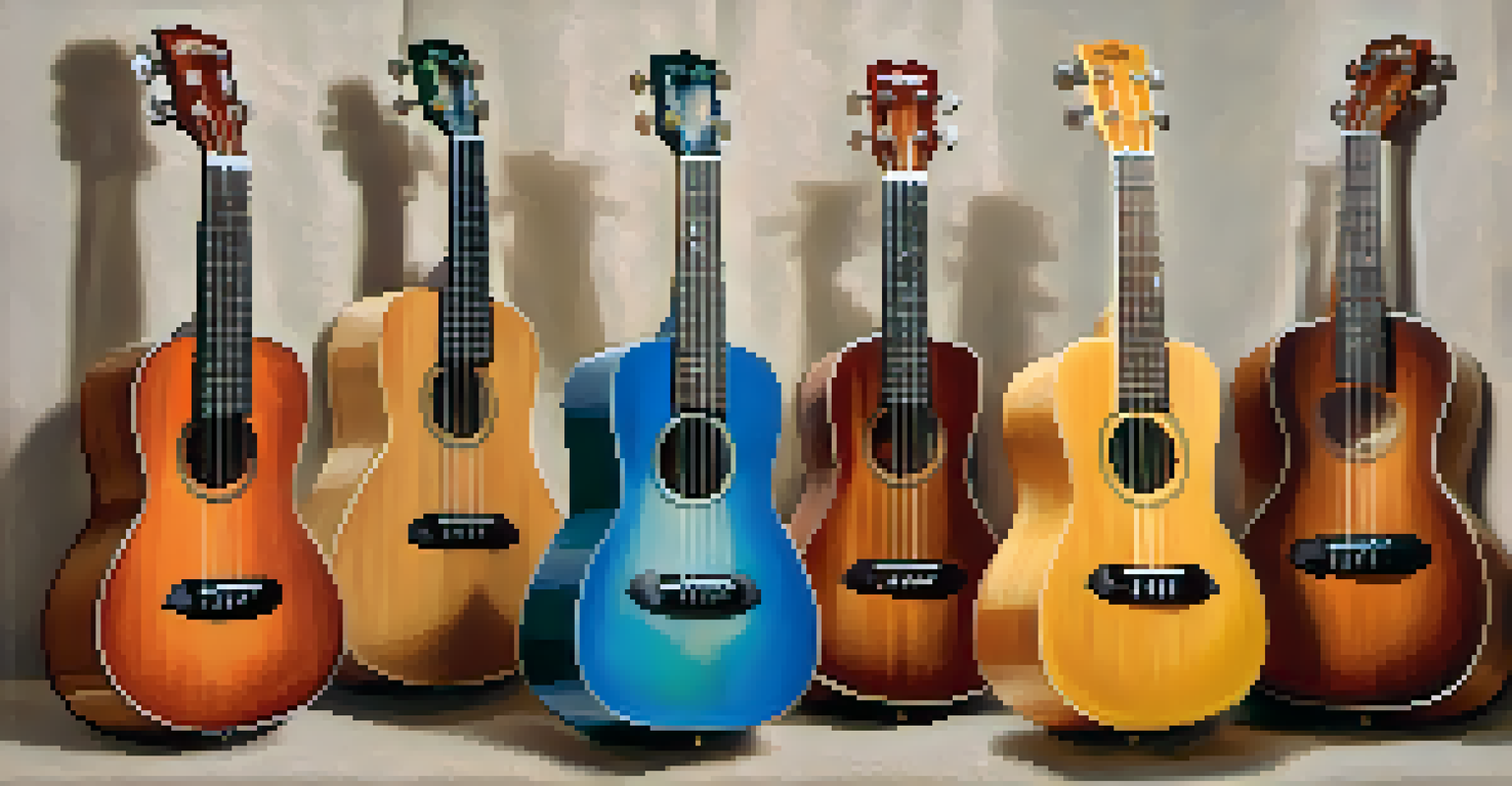How to Match Ukulele Size with Your Personal Playing Style

Understanding Ukulele Sizes: Soprano, Concert, Tenor, and Baritone
When it comes to ukuleles, size matters. There are four main types: soprano, concert, tenor, and baritone. Each size produces a different sound and has unique characteristics that may suit various playing styles.
Music is the shorthand of emotion.
The soprano, the smallest and most traditional size, is great for beginners and those who enjoy a bright, cheerful sound. Concert ukuleles offer a slightly deeper tone with more volume, making them ideal for solo performances.
Tenor ukuleles provide even more resonance and are favored by many professional players for their rich sound. Finally, the baritone, the largest of the group, sounds similar to a guitar, perfect for those who prefer lower tones.
Identifying Your Personal Playing Style: Strumming vs. Fingerpicking
Your playing style plays a significant role in choosing the right ukulele size. If you’re a strummer, you might want a soprano or concert ukulele, as they are easier to handle and provide a bright, punchy sound that complements rhythmic playing.

On the other hand, if you lean towards fingerpicking, a tenor or baritone ukulele could be more suitable. These larger instruments offer more space between the frets, allowing for easier note access and a fuller tone.
Choose Size Based on Sound
The size of the ukulele significantly impacts its sound quality, with larger models producing deeper tones and smaller ones delivering brighter sounds.
Understanding your primary playing style can help narrow down your choices and ensure you select a ukulele that enhances your musical expression.
Consider Your Physical Size and Comfort Level
When selecting a ukulele, it’s essential to consider your physical size and comfort. A smaller player might find a soprano or concert ukulele easier to manage, while larger individuals might prefer the heft of a tenor or baritone.
The beautiful thing about learning is that no one can take it away from you.
Comfort is key; if a ukulele feels awkward or heavy, it may hinder your playing experience. Hold the ukulele and see how it feels against your body—this can make a significant difference when practicing for extended periods.
Ultimately, finding a ukulele that feels comfortable in your hands will encourage you to play more often and enjoy the learning process.
Exploring Sound Quality: How Size Influences Tone
The size of the ukulele significantly affects its sound quality. Larger ukuleles like the tenor and baritone generally produce a deeper, richer tone due to their increased body size, while smaller sizes tend to have a brighter, more cheerful sound.
If you enjoy playing solo and want your music to resonate, a tenor might be the best option. Conversely, if you're looking to play in a group setting or sing along, the bright sound of a soprano could be perfect.
Consider Your Playing Style
Your personal playing style, whether strumming or fingerpicking, can help determine the most suitable ukulele size for your needs.
Experimenting with different sizes can help you discover the sound that resonates most with your musical taste.
Budget Considerations: Finding Quality in Your Size
Budget plays an important role in your ukulele selection. Generally, larger ukuleles like the tenor and baritone may require a higher investment, while soprano and concert models can be more affordable.
However, price doesn’t always equate to quality. Many budget-friendly options offer excellent sound and playability, so it's worth researching brands that cater to your size preference without breaking the bank.
Ultimately, a well-made ukulele, regardless of size, will provide you with a better playing experience and encourage you to enhance your skills.
Portability: Choosing a Ukulele for On-the-Go Playing
If you’re the type who enjoys taking your music everywhere, portability is a crucial factor. Smaller ukuleles like soprano and concert are lightweight and easily fit in a backpack, making them perfect companions for travel.
On the other hand, larger ukuleles, while offering richer tones, can be more cumbersome to transport. If you plan to play at home or in a dedicated space, portability may not be as significant of a concern.
Test Before You Invest
Trying out different ukuleles in-store allows you to find the right fit and sound that resonates with your musical preferences.
Consider how often you’ll be on the move with your ukulele, as this might influence your choice of size.
Trying Before You Buy: The Importance of Hands-On Experience
Nothing beats the experience of trying out different ukuleles in-store. This hands-on approach allows you to feel the instrument, test its sound, and see how well it fits with your playing style.
Take the opportunity to play various sizes and models, noting which feels most comfortable and resonates best with your musical ear. Don’t hesitate to ask for assistance from knowledgeable staff—they can provide valuable insights.

Remember, selecting a ukulele is a personal journey, and finding the right fit can make all the difference in your musical adventure.